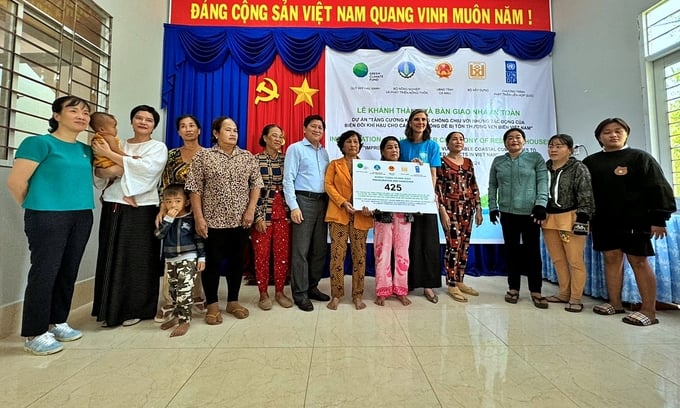November 27, 2025 | 22:27 GMT +7
November 27, 2025 | 22:27 GMT +7
Hotline: 0913.378.918
November 27, 2025 | 22:27 GMT +7
Hotline: 0913.378.918

UNDP Resident Representative in Vietnam Ramla Khalidi and Vice Chairman of the Ca Mau Provincial People's Committee Le Van Su handed over the houses to the people. Photo: UNDP.
These safe houses are designed to withstand storms and natural disasters and are the result of a collaboration between the Green Climate Fund (GCF), UNDP, the Department of Dyke Management and Natural Disaster Prevention (Ministry of Agriculture and Rural Development), the Department of Housing and Real Estate Market Management (Ministry of Construction), and the People's Committee of Ca MauProvince and neighbouring localities.
Mr. Le Van Su, Vice Chairman of the People's Committee of Ca Mau Province, said that the people of the coastal communes of the province have to cope with storms, high tides, and the harsh impacts of climate change every year. "Thanks to the support from the GCF Project, a large number of poor households in the province now have safe housing," he expressed.
With a coastline of 254 km, comprising 41 coastal and near-coastal communes and towns, Ca Mau still has many poor households without houses or the conditions to build houses.
On behalf of the Provincial People's Committee, Mr Su requested that central ministry agencies and donors continue to accompany Ca Mau in supporting poor households to stabilize their lives, ensure safety against natural disasters, and rise out of poverty.
Ms. Ramla Khalidi, UNDP Resident Representative in Vietnam, emphasized the importance of these houses. "Housing is our most valuable asset. Building safe houses is the foundation for the climate resilience of households living in coastal areas of Vietnam," she shared.
According to Ms. Khalidi, UNDP is always committed to supporting the construction and reconstruction of houses for climate-vulnerable households, particularly poor households, female-headed households, and the elderly.
Ms Nguyen Thi Het, representing one of the 425 households receiving houses today, emotionally shared that her family’s circumstances are very difficult, and they could not afford to build a house. "With the project's and the province's support, the dream of having a home to settle down and make a living has become a reality. I can now focus on working to improve my family's economy and rise out of poverty," she expressed.
Ms Doan Thi Tuyet Nga, Head of the Department of International Cooperation and Science and Technology at the Department of Dyke Management and Natural Disaster Prevention, informed that the GCF Project has impacted more than 5,000 poor households by supporting the construction of disaster-resistant housing.
"These houses are invaluable assets for poor households. We are proposing the development of a new project to build on these good practices while continuing to explore mechanisms for mobilizing international and other resources to expand and support the construction of safe, storm-resistant housing for more people," she said.
The project's priority in the coming time is to continue researching, surveying, and implementing pilots in coastal areas and the Mekong Delta.
UNDP's initiative plays a crucial role in efforts to help developing countries, including Vietnam, strengthen resilience in coastal areas.
The emergence of these safe houses marks an important step forward in enhancing the protection of people from the impacts of climate change, ensuring that communities can thrive even as climate change becomes increasingly severe.
Translated by Hoang Duy

(VAN) On November 27, in the meeting with Minister Tran Duc Thang, Mayor Yin Yong shared Beijing’s experience to improve environment and air quality.

(VAN) After 30 years, both sides identified strategic areas of cooperation: sustainable production, increasing coffee value and training for farmers.
/2025/11/27/4910-4-164708_294.jpg)
(VAN) On the afternoon of November 27 in Beijing, Minister of Agriculture and Environment Tran Duc Thang held a working session with several major Chinese enterprises operating in the agriculture and environment sector.

(VAN) The Department of Animal Health issued a provisional guideline requesting local authorities to increase surveillance, collect samples for testing, and conduct epidemiological investigations according to the established procedure.

(VAN) The United Nations recommends that Vietnam utilize data and artificial intelligence to enhance early disaster warnings and reduce GDP losses by 3.2% in the context of climate change.

(VAN) On the morning of November 27 in Beijing, Minister Tran Duc Thang and the Deputy Commissioner General of the General Administration of Customs of China signed a protocol on fresh jackfruit exports.

(VAN) As floodwaters recede, a vast network of irrigation works across eastern Gia Lai is emerging in a state of severe disrepair, with extensive damage demanding urgent restoration ahead of the 2025-2026 winter-spring cropping season.